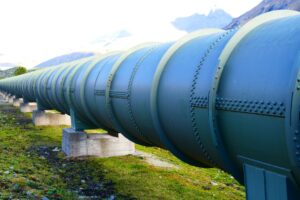BY DAVE GUTKNECHT
In the January online edition of Southside Pride, the editor generously published my response to his pro-war editorials: https://southsidepride.com/2023/01/28/a-response-to-sspride-ukraine-columns/.
Since then, U.S. war aims have only become clearer, thanks in part to investigative journalism outside the mainstream. The U.S. helped sabotage Ukraine negotiations, then sabotaged critical infrastructure of Germany and European allies. The pipeline attack was an act of war against those countries; to their shame, European officials have been silent.
For those who hear little but the official explanation of the Ukraine war: please broaden your sources to include voices such as Jeffrey Sachs, Scott Ritter, Noam Chomsky, Seymour Hersh, and others mentioned earlier. You are misinformed if you think the Russian war in Ukraine was unprovoked or if you think that Russia has persistently refused to negotiate concerning the Ukraine conflict. Visit the unapproved sources to get the unapproved news.
On Feb. 8, veteran investigative journalist Seymour Hersh published his sensational column detailing how the U.S., along with Norway and other suborned European nations, sabotaged a critical natural gas pipeline that supplied Germany and several other nations. European companies, backed by their respective governments, had invested billions in the pipelines, first opened in 2011 over U.S. opposition. Nord Stream was 49% owned by the European coalition and 51% by Russia’s Gazprom.
The U.S. plans regime change and plays the global hegemon, but the price of maintaining dominance is painfully high for Europe, and especially for Ukraine. Sanctions on Russia aimed at regime change have been a failure and are likely to remain so. But actions that sacrifice the German economy and prevent continued reliance on Russian natural gas have been a short-term success.
 The prevention of Nord Stream operations had been threatened, even publicly promised, over the past year by President Biden, Secretary of State Blinken, and Undersecretary Nuland. Along with top adviser Jake Sullivan, their discussions about destroying the pipeline, say Hersh’s sources, began in 2021. The action was planned in a way that allowed them to sidestep any requirement that they inform the few members of Congress with national security responsibilities.
The prevention of Nord Stream operations had been threatened, even publicly promised, over the past year by President Biden, Secretary of State Blinken, and Undersecretary Nuland. Along with top adviser Jake Sullivan, their discussions about destroying the pipeline, say Hersh’s sources, began in 2021. The action was planned in a way that allowed them to sidestep any requirement that they inform the few members of Congress with national security responsibilities.
Since the September 2022 sabotage, remarkably, mainstream U.S. media has either ignored this huge story or has denied U.S. responsibility and suggested that Russia was responsible – responses that weren’t credible earlier and are even less so now.
The sabotage was carried out to prevent European dependence on Russian fossil fuel energy; Blinken even pronounced the pipeline destruction a “tremendous opportunity” toward that end. This long-term strategic priority actually dates to the first Siberian pipeline, begun by the USSR, and initially sabotaged by the U.S., in the 1980s. Blinken warned against the pipeline in his book of that decade, bluntly titled “Ally vs. Ally.”
Nord Stream 1 proved to be a huge boon to Europe’s largest economy. The 2022 bombing was carried out to prevent Germany from backsliding on support for the war in Ukraine or on sanctioning Russian energy.
Conveniently, a gas pipeline from Norway (which fully collaborated in the sabotage and coverup) was opened the very next day after the Nord Stream explosions: a nicely timed bit of good news to cover up the disaster of the pipeline destruction. In early February, Seymour Hersh’s dramatic revelations were published, then were followed by the frightening environmental disaster in East Palestine, Ohio. Yet within two days the headlines screamed about unidentified balloons as a national security threat – a story a Chinese official correctly labeled hysterical and absurd.
These few details on media coverage matter because they indicate the depth of pro-war propaganda and message control in the U.S. media.
Authors of “War in Ukraine”
Medea Benjamin and Nicolas Davies (at CounterPunch.org) remind us what a knowledgeable citizenry should know about how our government fomented the crisis in Ukraine, a role that the corporate media has swept under the rug:
1. The 2015 Minsk II peace accord achieved a stable ceasefire line and steady reductions in casualties, but Ukraine failed to grant autonomy to Donetsk and Luhansk as agreed. Germany’s Merkel and France’s Hollande, signatories to the agreement, recently claimed that they only supported Minsk II in order to buy time for NATO to arm and train in preparation for war.
2. During the week before the invasion, U.N. monitors in Donbas documented a huge escalation in explosions around the ceasefire line, most of them by the Ukrainian government forces shelling Russian-speaking civilians, with the latter casualties estimated at 15,000 by 2022.
3. After the invasion, instead of supporting Ukraine’s efforts to make peace, the United States and the United Kingdom blocked or stopped them in their tracks. This has not changed.
Meanwhile, you can bet that many Europeans, along with thoughtful Americans, are considering the implications of what the U.S. is willing to do in order to get its way. Scott Ritter called the pipeline bombing “an economic Pearl Harbor.”
Dave Gutknecht went to prison for his opposition to the war in Vietnam (1972–1973), then built a career writing and publishing for cooperatives.
Publisher’s note: It is important for us to understand how we got to this point. Dave Gutknecht does a great job of filling in some essential background. Southside Pride is committed to supporting Ukraine in its struggle against Russian imperialist aggression.






















